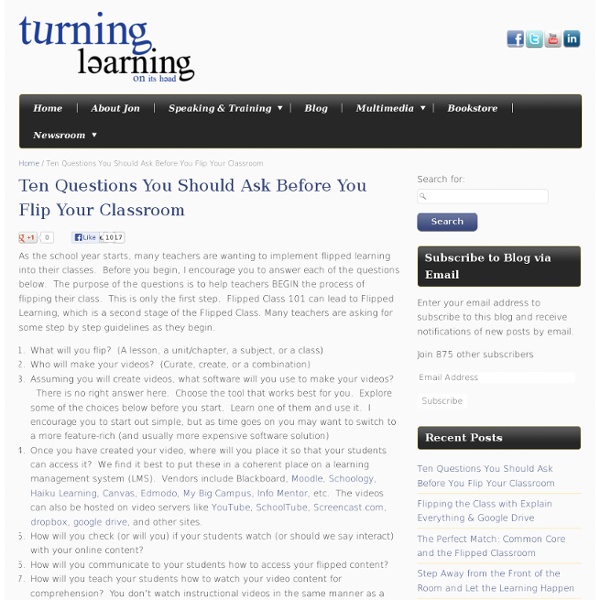Top 10 Do’s and Don’ts When Flipping Your Classroom #edchat
Produce material for YOUR students to engage them outside the classroom. Generic content works as a starting point but students have greater faith in their own teacher’s input.Decide on a workflow solution and stick to it. I use Edmodo to set assignments and annotate responses. Students are happy with this solution as it is cross platform and supports learning with library and backpack resources.Set specific deadlines for your students. If they are given a date then unfortunately that can be construed as midnight!! The old hand-in mantra of next lesson doesn’t fit the ‘flipped‘ class idea and as such can present a problem.Provide access for students who aren’t connected to the internet at home. Expect students to watch/read your material just because you tell them to. This post is in response to the success we have had with workflow and assessment for learning this academic year. Please contact me if you would like to discuss the ‘flipped’ class as I am very keen to hear any new ideas.
YA Books and More
YALSA Book and Media Awards and Lists for Libraries
*YALSA has launched the new Teen Book Finder Database, which is a one-stop shop for finding selected lists and award winners. Users can search this free resource by award, list name, year, author, genre and more, as well as print customizable lists. This new resource will replace the individual award and list web pages currently on YALSA’s site that are not searchable and that are organized only by year. Awards & Seals | Selected Lists I Teen Book Finder app & database I Committee Contacts | Additional Resources While these books and media have been selected for teens from 12 to 18 years of age, the award-winning titles and the titles on YALSA's selected lists span a broad range of reading and maturity levels. We encourage adults to take an active role in helping individual teens choose those books that are the best fit for them and their families. Book Awards & Seals Learn more about each award below and read speeches from winners. Selected Book & Media Lists Suggest a Title
5 Reasons Why the Flipped Classroom Works in Higher Education
Education research expert David Miller reveals 5 benefits flipped classrooms provide higher education. By David Miller February 10, 2015 The concept of “flipped classroom” is popular nowadays, and most people have learned that despite its name, the idea behind it is not very aerodynamic. However, it’s turning into a great movement. Instructors turn to flipped classrooms in several different combinations. Others begin a lesson by asking questions about the material students previously watched, and have students answer those questions via clicker technology. Flipped classroom also provides other benefits: 1. Although there are no studies to prove student engagement level in flipped classrooms, there’s plenty of other data that show students are more willing to use classroom time in a discussion-focused manner. Most professors who have already turned to flipping classes state that students are more willing to learn thanks to this new concept. 2. Page 1 of 2 12Next » Comments
A Thematic Approach to Planning Your Maker Space
When schools talk about the Maker Movement and creating maker spaces, they often focus their initial thinking on purchasing the tools and materials. This resource-driven approach can create a buzz in your school for some time; however, that excitement will inevitably fade. While resources are an important part of any maker space, taking a thematic planning approach is much more effective. No two maker spaces are alike or should be alike. While maker spaces often have a STEM orientation, they most certainly do not have to be limited to just those disciplines. To select themes for your maker space, it is important first to understand your learners. The next thing you should do is take time to evaluate the programs, offerings, and curricula within your school. In developing themes, it is also important to consider global trends and best practices. A thematic approach to planning also helps streamline the ordering process.
Middle School Maker Journey: Top 20 Technologies and Tools
"It's not about the tool," they say -- but sometimes it is. In our middle school makerspace, students have been using a variety of tools and technologies in a variety of projects and activities. And there are many more that we've yet to explore and experience. While our makerspace is still in its infancy, it feels like we've had the program forever. As of this writing, a second group of students is in the midst of Design Experience One. We haven't had that much time to delve into projects in depth, but you can expect more from us later in the year. Before I go any further, let me say that we realize just how fortunate we are. The Lure of Bright, Shiny Objects Makerspaces are too often defined by things -- hardware, software, other technologies -- which can engender a shopping-list mentality among people interested in creating such a learning environment. 1. We want students to collaborate effortlessly, express themselves freely, and do so in ways not possible in other classrooms. 2. 3.



